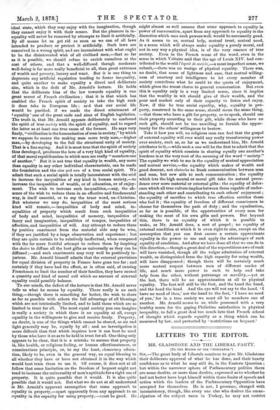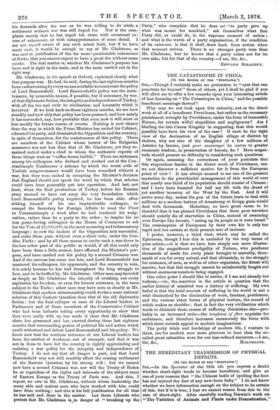LETTERS TO TIIE EDITOR.
MR. GLADSTONE AND THE LIBERAL PAR*.
[TO THE EDITOR OF THE "EPEOTATOR."1
Szn,—The great body of Liberals continue to give Mr. Gladstone their deliberate approval of what he has done, and their hearty confidence as to what he may still do, in the Eastern Question ; but within the narrower sphere of Parliamentary politics there are some doubts, or more than doubts, expressed as to whether he had not better have kept himself within those limits of speech and action which the leaders of the Parliamentary Opposition have accepted for themselves. Ile is not, 1 presume, charged with inconsistency, though, like every one else who desires the eman- cipation of the subject races in Turkey, he may not restrict his demands after the war as he was willing to do while a settlement without war was still hoped for. Nor is the com- plaint merely that he has urged his cause with occasional ex- cess of vehemence, or with misapprehension of some detail. I am not myself aware of any such minor fault, but if he have made such, it would be enough to say of Mr. Gladstone, as was said in justification of the far more questionable vehemence of Burke, that you cannot expect to have a great fire without some smoke. The real matter is, whether Mr. Gladstone's purpose has been and is right in the main, and in the main carried out in the right way.
Mr. Gladstone, in his speech at Oxford, explained clearly what that purpose was. He had, he said, during the last eighteen months been endeavouring by every means available to counteract the policy of Lord Beaconsfield. Lord Beaconsfield's policy was the main- tenance, by peaceable means, if possible, but if necessary, by war, of that diplomatic fiction, the integrity and independence of Turkey, with all the too real evils to civilisation and humanity which it involved. If we look back on those eighteen months, we see how steadily and how ably that policy has been pursued, and how nearly it has succeeded, nay, how probable that even now it will more or less modify the future course of events. Nothing is now clearer than the way in which the Prime Minister has united his Cabinet, educated his party, and dominated the Opposition and the country, in spite of themselves, for the maintenance of this policy. There are members of the Cabinet whose horror of the Bulgarian massacres was not less than that of Mr. Gladstone, yet they re- mained united under a chief to whom the authentic reports of these things were as " coffee-house babble." There are statesmen among his colleagues who devised and worked out at the Con- stantinople Conference a scheme by which the worst evils of Turkish misgovernment would have been remedied without a war, but they were united in accepting the Minister's decision that England should not speak the word by which that scheme could have been peaceably put into operation. And last, not least, when the final prostration of Turkey before the Russian army seemed to have cut away the very foundation which Lord Beaconsfield's policy required, he has been able, after ridding himself of his one impracticable colleague, to compel the Secretary for Foreign Affairs to send the Fleet to Constantinople a week after he had tendered his resig- nation, rather than be a party to the order ; to inspire his no leas peace-loving colleagues in the House of Commons to ask for the Vote of £6,000,000, in the most menacing and inflammatory language ; to cow the leaders of the Opposition into surrender, and make them pass, without even a silent vote, under the Can- dine Forks ; and by all these means to excite such a war-fever in the less sober part of the public as would, if all this could only have been done a little sooner, have effected the Minister's pur- pose, and have carried out his policy by a second Crimean war. And if the success has come too late, and Lord Beaconsfield has mastered his colleagues, his opponents, and the country in vain, it is solely because he has had throughout the long struggle to face, and to be baffled by, Mr. Gladstone. Other men may have felt as deeply as Mr. Gladstone the iniquity of crushing out every aspiration for freedom, or even for human existence, in the races subject to the Turks ; other men may have seen as clearly as Mr. Gladstone that modern statesmanship could devise a more rational solution of this Eastern Question than that of the old diplomatic fiction ; but the final collapse at once of the Liberal leaders in Parliament and of those members of the Conservative Cabinet who had been hitherto taking every opportunity to show that they were really with us, has made it clear that Mr. Gladstone alone has possessed and has exerted during these last eighteen months that commanding genius of political life and action which could withstand and defeat Lord Beaconsfield and his policy. We know now that the cautious reticence of our Liberal leaders has been the caution of weakness, not of strength, and that it was not in them to have led the country in rightly appreciating and resisting a war policy for the integrity and independence of Turkey. 1 do not say that all danger is past, nor that Lord Beaconsfield may not still sensibly affect the coming settlement of the Eastern Question by his strong will ; but we cannot now have a second Crimean war, nor will the Treaty of Baden be as regardless of the rights and interests of the subject races of Eastern Europe as the Treaty of Paris was. And this, I repeat, we owe to Mr. Gladstone, without whose leadership the many able and zealous men who have worked with him could have done nothing ; and this is his fall justification for all that be has said and done in the matter. Let those Liberals who protest that Mr. Gladstone kin danger of " breaking up the Party," who complain that he does not "to party give up what was meant for mankind," ask themselves what that Party did, or could do, in the supreme moment of action ; and what is the worth of a party organisation, if the condition of its existence is that it shall draw back from action when that moment arrives. There is no stronger party man than Mr. Gladstone, but he knows that a party exists not for its- own sake, but for that of the country.—I am, Sir, &c.,
EDWARD STRACHEY.



































 Previous page
Previous page